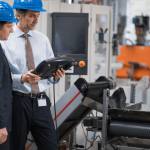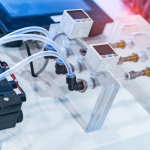Top Factors to Consider When Buying an Air Compressor
Whether you’re a weekend DIYer, small business owner, or part of an industrial project, choosing the right air compressor can improve performance, save time, and reduce maintenance headaches. Keep reading to explore top factors to consider when buying air compressors for sale with Air & Hydraulic Equipment.
Determine Your Air Requirements
Before anything else, take inventory of your air tool requirements. Each tool has a specific air demand measured in PSI (pounds per square inch) and CFM (cubic feet per minute). Your air compressor must meet or exceed the requirements of the most demanding tool you plan to use. Also, consider duty cycle. Some compressors are built for intermittent use, while others are designed to run continuously. Misjudging this can result in premature wear.
Not sure what your PSI and CFM needs are? Contact Air & Hydraulic Equipment for guidance on air compressors for sale.
Portable vs. Stationary: What Suits Your Space?
Another major decision is choosing between a portable or stationary air compressor. Portable models are ideal for job sites or moving around a garage, while stationary units are often larger, more powerful, and perfect for permanent workshop installations.
Keep in mind that even some “portable” models can be heavy, so wheel kits and handles may influence your decision.
Tank Size and Airflow Matter
Tank size directly affects how long you can run your tools before the compressor kicks back on. For example, an 80-gallon tank is typically used in industrial settings, while a 6-gallon pancake compressor might be enough for smaller tasks like trim carpentry.
However, don’t assume bigger is always better. Think about space limitations and frequency of use. Also, verify the compressor’s CFM rating meets your most demanding tools, especially if you’ll use multiple tools at once.
Power Sources: Electric, Gas, or Diesel?
The power source you choose affects not only where you can use the compressor, but also maintenance and cost. Electric compressors are clean, quiet, and ideal for indoor use, but they require access to an outlet with sufficient amperage. Gas and diesel-powered units are better for remote or outdoor applications, offering more power and independence.
Make sure your environment supports the power source you choose. Running a gas-powered compressor indoors without proper ventilation can be dangerous.
Don’t Forget About Noise Levels and Maintenance
Consider decibel ratings if you’ll be working in enclosed or residential areas. Oil-free compressors are quieter and require less maintenance but may wear out faster with frequent, heavy use. Oil-lubricated units last longer but require regular upkeep.
Also consider ease of access to filters, belts, and drain valves. Maintenance-friendly designs reduce downtime and frustration.
Advanced Features That Improve Performance
Modern air compressors come equipped with features that enhance usability and performance:
- Thermal overload protection prevents the motor from overheating.
- Dual-stage compressors offer more efficiency for higher PSI applications.
- Automatic drain systems reduce manual maintenance.
- Integrated regulators and gauges help maintain consistent pressure.
These features may increase upfront costs but pay off in longevity and ease of use.
Why Choose Air & Hydraulic Equipment?
At Air & Hydraulic Equipment, we go beyond just selling products. We help clients make smart, long-term decisions. With decades of industry experience, we understand the unique needs of each application, from home workshops to large-scale manufacturing. Our inventory includes a full range of air compressors for sale, and we also provide service, repairs, and expert support throughout the compressor’s lifespan.
Ready to buy with confidence? Contact us at Air & Hydraulic Equipment to explore top-quality air compressors for sale and connect with our experts!









